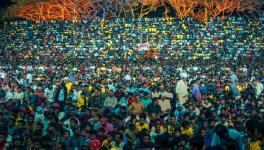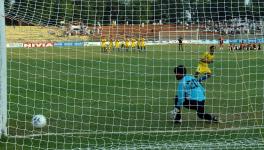West African Footballers Face New Competition in India
West African players such as Dudu Omagbemi (above) have long made the move to play football in India
As a teenager, when Christopher Chizoba Iyikwobe* thought of India the only image that came to mind was of Bollywood films. Football was never a thought but more than 13 years after being bundled onto a plane to Kolkata as an 18-year-old with no club in mind, the striker has found a home playing in the country.
Chizoba has played for more than five Indian teams, including giant Mohun Bagan, and the 31-year-old now finds himself back in the place where his professional career began.
With the India Super League (ISL) and the I-League (the second division) growing, India's men's FIFA ranking up from 150 in 2013 to 104 today and scores of local tournaments, state leagues and a passionate fan base, football in India is rapidly growing - and it's charmed Chizoba. Even the city of Kolkata, another cultural stronghold spread on the coast and home to Chizoba's current side Tollygunge Agragami FC, reminds him a bit of Lagos. The only thing missing is an African restaurant.
"At first I never wanted to come because I never heard of anyone who went to India to play,"the 31-year-old tells DW. But having stayed for so long, his feelings have changed.
"India is the place that God has destined me to be, to take as my home. In one way or the other I will always find myself coming back."
Historic pathway
Chizoba is one of the scores of mostly west African footballers who have poured into India's football scene across the past 50 years.
Since the early 1980s, India opened its doors to African players when young Nigerian players caught the attention of local clubs. One of them, Chima Okorie, with his bulldozing style of play dominated the sport.
Arriving as a student in India in 1984 and at first playing at university, Okorie caught the eyes of football club Mohammedan Sporting. Before his retirement two decades later, he would go on to play for four more teams, including giants Mohun Bagan and East Bengal, scoring more than 300 goals. Many believe it was Okorie's performances that prompted Indian clubs to pursue African talent, and the likes of Ranti Martins, Dudu Omagbemi and Yusif Yakubu all followed.
That first wave of West African players not only opened the door but also set high standards for the generations to come, and the expectation of good performances has survived until today.
"The night before, you won't sleep from fan messages, telling you they want to win this game," Ansumana Kromah, another Tollygunge player, tells DW. "If we lose, the police have to escort us from the field."
Ranti Martins is one of the legendary West African players to have played in India
Change in the air
While African players have largely thrived in India over the years, things are changing as the desire for better quality players from Europe grows.
Indian clubs are only allowed to sign a maximum of five foreign players per season, meaning the competition for space is intense. All those making the venture to either play in India or to build an international portfolio in the hopes of landing a move to a prominent European side may now be forced to look elsewhere.
With Mohun Bagan recently signing Florentin Pogba, formerly of French side Sochaux, players such as Ansumana Kromah are left struggling to find a spot. Many West Africans players in India are in a similar situation and have turned to fast-paced, semi-professional seven-a-side tournaments that attract a full house in dry-weather months. Here, West African players dominate and earn around $60 (€60) per match. It remains a far cry from the ISL or the I-League.
"It's really sad for us," Kromah says. "They only want high profile players. If I get the opportunity, I'll leave."
Local players are also affected. Shouvik Bhattacharjee, formerly of Kolkata's Southern Samity club, says the increased focus on signing foreign players has seen grassroots football and the development of Indian players neglected.
"I would like that in one or two leagues, there are only Indians so that we can get more talents out of it," Bhattacharjee says.
"In every local tournament there are foreign players and even in the I-League and ISL they are taking the limelight. They're good but even Indians got talent," he adds.
Stealing the game
As the football frenzy spreads and more locals get in the game, West African success stories like Chizoba's will become less common. Already, as some players told DW, there's a noticeable decline in the number of Nigerian and Ghanaian players. Even fewer Africans are making it to the I-League or the ISL. Instead, many turn to seven-a-side tournaments to survive.
Local players face challenges too. The reduction to the number of foreign players allowed in the squad to five is a strategic move to aid development of Indian players, but now local players are having to compete with higher quality players from Europe. If African players once stole the spotlight, new European imports might just steal the game.
*Editorial note: Chizoba is currently serving a two-year worldwide ban from all football-related activities until September 2023. After a spell at Arambagh FC, the Bangladesh Football Federation concluded in 2021, that players and officials of the club had been involved in online gaming, betting, and match-fixing, and banned Chizoba and others as a result.
The Nigerian says he cleared his name after petitioning with FIFA. DW have contacted FIFA and the Nigerian Football Federation for clarification but have yet to receive a response.
Get the latest reports & analysis with people's perspective on Protests, movements & deep analytical videos, discussions of the current affairs in your Telegram app. Subscribe to NewsClick's Telegram channel & get Real-Time updates on stories, as they get published on our website.

























